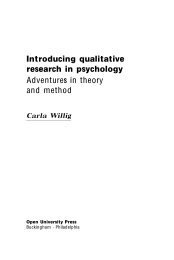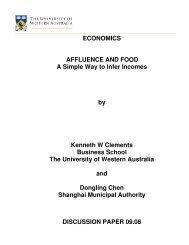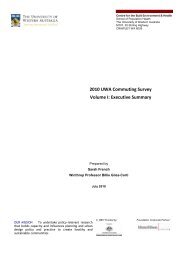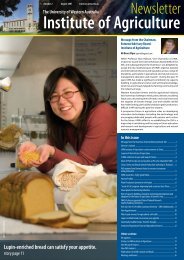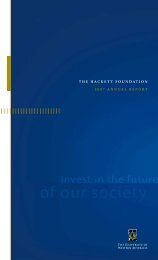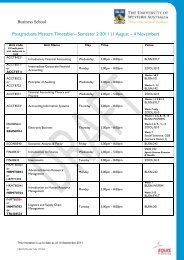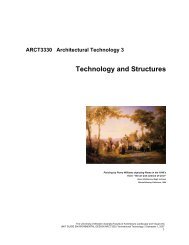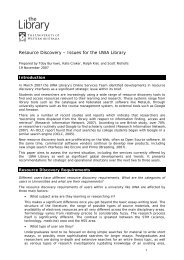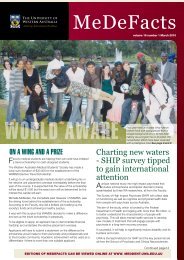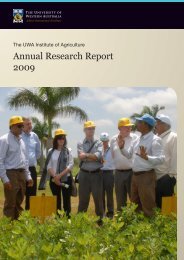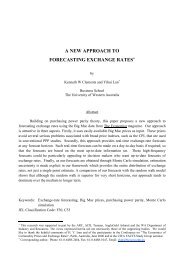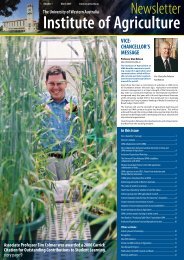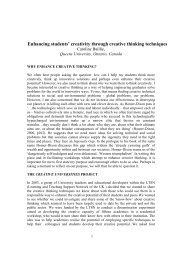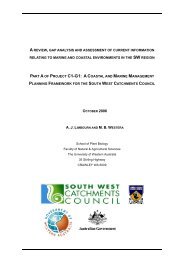A Rich History - The University of Western Australia
A Rich History - The University of Western Australia
A Rich History - The University of Western Australia
Create successful ePaper yourself
Turn your PDF publications into a flip-book with our unique Google optimized e-Paper software.
CONNECTA <strong>Rich</strong> <strong>History</strong> Towards a Brilliant FutureAt the heart <strong>of</strong> a great business school is the passion, enthusiasm andcommitment demonstrated by the connections between staff, students,alumni and the community in the pursuit <strong>of</strong> achieving internationalexcellence. As we move into the new world-class Business Schoolfacilities, this commemorative journal takes a moment to reflect on thecontributions <strong>of</strong> the many alumni, staff, community leaders and studentswhose determination to make a positive difference in the world has built afoundation <strong>of</strong> which we can all feel very proud. <strong>The</strong> stories that unfold inthese pages will inspire you, as we capture the essence <strong>of</strong> education totransform the lives <strong>of</strong> people. <strong>The</strong>se are the stories and insights that carryus forward and continue to inspire us to achieve international excellence.Celebrate with us!
UWA Business SchoolAt <strong>The</strong> <strong>University</strong> <strong>of</strong> <strong>Western</strong> <strong>Australia</strong>, we areembarking upon a new chapter in business education.As we unveil a new home for our Business School, weacknowledge the vision <strong>of</strong> the original founders <strong>of</strong><strong>The</strong> <strong>University</strong> <strong>of</strong> <strong>Western</strong> <strong>Australia</strong> and look towards afuture in which this great institution is positioned wellto deal with the challenges and accept the opportunities<strong>of</strong> the years ahead.We are in fact celebrating the contribution <strong>of</strong> the UWA BusinessSchool to business education in <strong>Western</strong> <strong>Australia</strong> and furtherafield, its relevance to the broader business community and itslinks across the faculties and schools <strong>of</strong> our <strong>University</strong>.As a Vice-Chancellor there are few things more satisfying thanthe dedication <strong>of</strong> new and improved facilities to the pursuit <strong>of</strong>learning. Yet this is more than a celebration <strong>of</strong> a new facility. Withthe help <strong>of</strong> our partners, the talent <strong>of</strong> the business leaders on ourBusiness School Board and the staff <strong>of</strong> our faculty, led by DeanTracey Horton, we will be able to be at the forefront <strong>of</strong> businesseducation excellence.With the generous support <strong>of</strong> our partners and the broadercommunity, we have built an outstanding facility and establisheda fund that will enable us to attract world leaders in businesseducation and <strong>of</strong>fer outstanding opportunities for undergraduateand postgraduate students.Our Business School enjoys a reputation as a leader in <strong>Australia</strong>and abroad. We are aiming to be among the top 50 universitiesin the world by 2050 and the School will help us to achieve thatgoal. At UWA, world-class is our minimum standard.<strong>The</strong> Business School, like the rest <strong>of</strong> <strong>The</strong> <strong>University</strong> <strong>of</strong><strong>Western</strong> <strong>Australia</strong>, has a proud history <strong>of</strong> excellence inresearch, teaching and learning. It continues to providehigh quality students with a high quality education.Many graduates have gone on to forge successfulcareers and to make a difference to the world.We seek to build on these foundations. We will continue todevelop the School’s reputation worldwide. We will continue tostrengthen our links to the business community, and in doingso, be at the forefront <strong>of</strong> international best practice. Truly greatbusiness schools are created through the dedication, commitmentand support <strong>of</strong> their alumni and the business community in whichthey operate. <strong>The</strong> participation <strong>of</strong> our external partners is verymuch an integral element <strong>of</strong> our strategic development.With an expanded network <strong>of</strong> business supporters who areprepared to invest directly in our staff, students and research,we have been able to develop the breadth <strong>of</strong> business activitieswoven into our core learning programs to provide a connectionwith the ‘real world’. This commemorative journal takes a momentto provide snapshots <strong>of</strong> what has been achieved and celebratesthe achievements <strong>of</strong> too many to mention individually.In achieving our initial fundraising target <strong>of</strong> $25 million, wegratefully acknowledge the philosophy <strong>of</strong> giving that underpinsthese achievements and say thank you. That philosophy anddesire to contribute to the greater good is itself a central themewhich encases the core business <strong>of</strong> this School. With yourongoing support we will achieve what we dream today, andposition the Business School <strong>of</strong> <strong>The</strong> <strong>University</strong> <strong>of</strong> <strong>Western</strong><strong>Australia</strong> at the forefront <strong>of</strong> international excellence.Pr<strong>of</strong>essor Alan RobsonVice-Chancellor – UWAPr<strong>of</strong>essor Tracey HortonDean – UWA Business School45Business School
1972 Pr<strong>of</strong>essor Bernard Key is appointed to lead Japanese Studies,established as a response to developing <strong>Western</strong> <strong>Australia</strong>n traderelations with Japan. <strong>The</strong> idea puts UWA on the map globally.Gilbert George was one <strong>of</strong> the first graduates <strong>of</strong> the Japaneseprogram. Over the course <strong>of</strong> a 20 year career in business heestimates he has been involved in over $1 billion dollars worth<strong>of</strong> Japanese investment in <strong>Australia</strong>. <strong>The</strong> <strong>University</strong> continues tomaintain strong links with Japan today, including Business Schoolpartnerships with Mitsui & Co and Mitsubishi Development.Future Premier <strong>of</strong> <strong>Western</strong> <strong>Australia</strong> Ge<strong>of</strong>f Gallop graduates with aMasters <strong>of</strong> Economics in 1972. He is Premier from 2001-2006.that will see trade increase from $20 million to over $3 billion,a figure not believed by commentators. Trevor Eastwood, as ayoung executive at Wesfarmers co-operative, enlists the advice<strong>of</strong> Dr Rony Gabbay on Halal meat practices and accreditation toestablish Wesfarmers trade links with the Middle East. <strong>Australia</strong>nexport to the Middle East reaches the predicted $3 billion level in1990-91 and today continues to grow.1977 Pr<strong>of</strong>essor Charles Mulvey’s research into labour marketsdevelops the Faculty’s specialisation in Industrial Relations (IR).This is particularly relevant to iron ore development and expansionin the Pilbara as <strong>Australia</strong> is the most unionised country in theworld with wages fixed through an accord and a central system <strong>of</strong>1991 <strong>The</strong> growing demand for a postgraduate Master <strong>of</strong> BusinessAdministration sees the Graduate School <strong>of</strong> Management (GSM)separate from the Department <strong>of</strong> Economics and Commerceto form another School. Pr<strong>of</strong>essor Andre Morkel is appointedas Head <strong>of</strong> School. An Advisory Council <strong>of</strong> business leaders isestablished and Trevor Eastwood is appointed as the inauguralChair. Influential business leaders contribute their expertise andexperience in an advisory capacity in order to further developmanagement education in <strong>Western</strong> <strong>Australia</strong>.Mid 2000s UWA embarks on a ‘one university’ strategic reviewand identifies as a strategic direction building an internationalpresence in delivering a world class education.2006 <strong>The</strong> Business School Campaign, Tomorrow Starts Here,is <strong>of</strong>ficially launched with $12 million support pledged towardsthe $25 million target. <strong>The</strong> Business School Campaign marks astrategic level <strong>of</strong> engagement and exchange with the businesscommunity and industry sectors.1971 1972 1987 1990200620091973 Pr<strong>of</strong>essor Peter Longton is Dean when a Masters <strong>of</strong>Business Administration (MBA) is introduced in 1973 by Pr<strong>of</strong>essorAndrew Brown, Chair <strong>of</strong> Commerce, Pr<strong>of</strong>essor Roy Lourens andPr<strong>of</strong>essor Philip Brown with significant support from the MilneBequest. Demand far outstrips supply and students are requiredto submit letters from their employers stating that they were ableto attend at least one class during the 2-5pm time slot. Dr MichaelChaney, esteemed business leader, philanthropist and our currentUWA Chancellor, is one <strong>of</strong> the first students to come through theMBA program. Current Premier <strong>of</strong> <strong>Western</strong> <strong>Australia</strong>, Colin Barnettgraduates with a Bachelor <strong>of</strong> Economics (Honours).1974 <strong>The</strong> 1970s sees a boom in <strong>Western</strong> <strong>Australia</strong>n trade withthe Middle East. In response, Dr Rony Gabbay establishes adegree structure with a Middle East focus. Dr Gabbay predictsexpanding trade opportunity for <strong>Australia</strong> with the Middle Eastadministering disputes through an industrial relations commission.Industrial Relations at UWA has a multi-disciplinary approachand a growing focus on applied IR through the lens <strong>of</strong> workplacepsychology, sociology and industrial dispute resolution. In 1982<strong>The</strong> Department <strong>of</strong> Industrial Relations is created.1987 Research into resources boom-related migration leadsseveral members <strong>of</strong> the Faculty to establish <strong>The</strong> Trade,Migration and Development Research Centre. Its key aim is toinvestigate the impact <strong>of</strong> migration on <strong>Australia</strong>’s socio-economicdevelopment. Focusing on the Indian Ocean countries, researchexpertise covers areas such as tourism, trade, globalisationand development.2004 Pr<strong>of</strong>essor Alan Robson is appointed Vice-Chancellor tolead the <strong>University</strong> towards its goal <strong>of</strong> achieving internationalexcellence. UWA aims to rank amongst the top 50 universitiesworld-wide by 2050. UWA is currently ranked within the top 130and is the only university in <strong>Western</strong> <strong>Australia</strong> ranked within thetop 500. <strong>The</strong> Business School is well positioned to take up thischallenge. Pr<strong>of</strong>essor Robson supports a proposal presented byTony Howarth (Chair, GSM Advisory Council) and Mark Barnaba(GSM, Advisory Council) to implement a Business SchoolFundraising Campaign.2005 Pr<strong>of</strong>essor Tracey Horton is appointed as Dean to leadthe UWA Business School strategy towards achieving aninternationally benchmarked top 50 university ranking.2007 Pr<strong>of</strong>essor Tracey Horton, Dean, leads the integration <strong>of</strong> theSchool <strong>of</strong> Economics and Commerce and the Graduate School <strong>of</strong>Management to form the UWA Business School, to facilitate thevision <strong>of</strong> becoming a leading institution in the Australasian region.2009 <strong>The</strong> new UWA Business School world-class facility is<strong>of</strong>ficially launched May 3, 2009 by Premier Colin Barnett.<strong>The</strong> fundraising target <strong>of</strong> $25 million is achieved.[<strong>The</strong> theme <strong>of</strong> this historical outline is drawn from Emeritus Pr<strong>of</strong>essor Reg Appleyard’s chapter onthe Power and Influence in the Business and Law Faculties on the Administration and Governance<strong>of</strong> the State, and in the Private Sector and will be published in a commemorative book for the UWAcentenary celebrations.]1011Business School
<strong>The</strong> UWA Business School CampaignTomorrow Starts HereA World-Class Business SchoolAround 2002 a conversation developed between Dr Tony HowarthAO, Chair <strong>of</strong> the former Graduate School <strong>of</strong> Management AdvisoryCouncil, his fellow Council member, Mark Barnaba, and the thenDeputy Vice Chancellor, Pr<strong>of</strong>essor Alan Robson, regarding the role<strong>of</strong> UWA in developing best practice in business education. At thisstage Pr<strong>of</strong>essor Robson was part <strong>of</strong> executive level discussionswhich were setting the scene for UWA’s strategic direction to befixed towards benchmarking international excellence with a goal <strong>of</strong>achieving within a top 50 rank <strong>of</strong> universities globally.Critical elements for the future <strong>of</strong> the Business School werediscussed including: new infrastructure; a fundraising campaignto contribute to a new state-<strong>of</strong>-the-art building and a FuturesFund to support staff and students <strong>of</strong> the Business School; aDean who could build stronger external links with business; a highpr<strong>of</strong>ile Board with a keen interest and strong belief in the value<strong>of</strong> business education; and strong and visible support from theSenate and the Vice-Chancellor.A <strong>Rich</strong> <strong>History</strong> <strong>of</strong> ConnectionsThough from very different backgrounds, Mark Barnaba andDr Tony Howarth were both members <strong>of</strong> the former GraduateSchool <strong>of</strong> Management Advisory Council for a number <strong>of</strong> years.Mark Barnaba graduated with a Bachelor <strong>of</strong> Commerce with First-Class Honours and was a recipient <strong>of</strong> the JA Wood Memorial prizeand prestigious Hackett Scholarship as one <strong>of</strong> the university’shighest achieving students. Dr Tony Howarth left school in yearten and was educated in-house through the bank training system.Originally from New South Wales, he moved to <strong>Western</strong> <strong>Australia</strong>during his banking career and built a strong connection to the<strong>University</strong> through his role as Managing Director <strong>of</strong> Westpac.As former Graduate School <strong>of</strong> Management Advisory Councilmembers, both men feel a deep commitment to UWA and apr<strong>of</strong>ound appreciation for the value a world-class education <strong>of</strong>fersthe <strong>Western</strong> <strong>Australia</strong>n community. For Mark his commitmentcomes from the personal connection he has to UWA through hislearning experiences as an undergraduate.Tomorrow Starts Here,A Brilliant FutureDr Tony Howarth AO, Chair, Fundraising Committee says <strong>of</strong> thesuccess <strong>of</strong> the campaign:“I think the overwhelming sense is a great enjoymentand satisfaction <strong>of</strong> being part <strong>of</strong> the <strong>University</strong> andwanting to give back. A lot <strong>of</strong> people have re-engagedwith the <strong>University</strong> at this time and had fond memories<strong>of</strong> UWA from prior experiences as students, parents andstaff. <strong>The</strong> <strong>University</strong> Club also attracted alumni and thebusiness community on campus – for some after a longhiatus from campus activities.”Left to right: Mark Barnaba, Pr<strong>of</strong>essor Tracey Horton, Dr Tony Howarth.Mark Barnaba describes his motivation for the commitment intime and resources to the UWA Business School for overseven years.“<strong>The</strong> Business School Campaign experience ranks asone <strong>of</strong> the single most gratifying things that I havebeen involved with in a pr<strong>of</strong>essional sense. Educationis about developing yourself and contributing to thecommunity. It is valuable in its own right. I am sure mylife would be different without it.”On Sunday 3 May, 2009 the new world-class UWA BusinessSchool was <strong>of</strong>ficially opened by the Honourable Colin BarnettMLA, Premier <strong>Western</strong> <strong>Australia</strong>.Pr<strong>of</strong>essor Robson made a commitment to supporting a newdirection for the Business School including providing afundraising team.Mark Barnaba commented on the Vice-Chancellor’s support:“Alan Robson is a true visionary. He understood thecritical importance <strong>of</strong> a strong Business School withhealthy and active external links to achieving his overallgoals for the <strong>University</strong>. And he was prepared to backhis intuition with resources.”As newly appointed Chair <strong>of</strong> the Business School Board, MarkBarnaba invited <strong>Rich</strong>ard Goyder, CEO, Wesfarmers; Dr JohnPoynton AM, Executive Chair, Azure Capital, Dr Fiona Wood AM,Director, West <strong>Australia</strong>n Burns Services and Andrew Roberts,CEO, Multiplex, to join the newly formed Business School Board.Inaugural members have since been joined by Don Voelte, CEO,Woodside; Jimmy Wilson, President, BHP Billiton Stainless Steel;John Akehurst, Director CSL Limited and Adrian Fini, Non-Executive Director, Mirvac group. <strong>The</strong> Board has played a criticallyimportant role for the Business School in raising its external pr<strong>of</strong>ile,contributing to fundraising and acting as an advisory body forstrategic decisions.“<strong>The</strong> four Pr<strong>of</strong>essors I had for my honours year wereGe<strong>of</strong>f Soutar in Research Methodology, and threeChicago <strong>University</strong> PhDs in Finance: Ian Eggelton,Izan and Philip Brown. I knew they had world-classbackgrounds and they had a fundamental impact on thequality <strong>of</strong> my education,” said Mark.Pr<strong>of</strong>essor Tracey Horton was appointed Dean in 2005, to leadthe new direction for the Business School and the TomorrowStarts Here Business School Campaign. Hailing from Stanfordwith impressive international commercial experience and theacademic pedigree to match, over the course <strong>of</strong> five years shedeveloped connections with the business community on behalf <strong>of</strong>the Business School that developed into innovative partnershipsdelivering benefits for all parties.<strong>The</strong> Business School Campaign is an extraordinary success storyin tertiary fundraising in <strong>Australia</strong>. <strong>The</strong> international reputation andpr<strong>of</strong>ile <strong>of</strong> UWA Business School is strengthened by increasedinvestment through the appointment <strong>of</strong> Pr<strong>of</strong>essorial Chairs,the establishment <strong>of</strong> a scholarship program and investment inretaining and attracting quality staff.1213Business School
<strong>The</strong> Business School Board<strong>The</strong> UWA Business School is very fortunate in having the closeinvolvement <strong>of</strong> a high-calibre Business School Board.<strong>The</strong> Board is made up <strong>of</strong> experienced leaders representative <strong>of</strong> thekey industry sectors <strong>of</strong> the WA economy who visibly demonstratetheir support and guidance.<strong>The</strong> role <strong>of</strong> the Business School Board is to provide leadership tothe School in achieving its strategic objectives. Members also takean active role in: attracting high pr<strong>of</strong>ile academics and businesspeople; representing and promoting the Business School withinthe <strong>University</strong>, the broader business community in <strong>Australia</strong> andoverseas; and in increasing opportunities for students. Initiativesfor students include members providing guest lectures and BoardRoom luncheons for high-achieving students.<strong>The</strong> Board has also focused on developing the School’s financialfoundations so that like any dynamic and progressive enterprise,it can resource its future.Dean, Pr<strong>of</strong>essor Tracey Horton says:“<strong>The</strong> Board members are generous with their timeand their wisdom and they actively work with us onmany levels, from developing strategy to identifyingopportunities and building engagements withcompanies that are mutually advantageous.”14Board Members 2009Business School Board from left to right: Pr<strong>of</strong>essor Iain Watson, Deputy Dean (Operations); Adrian Fini, Non-Executive Director, Mirvac Group; Pr<strong>of</strong>essor Izan, Deputy Dean;<strong>Rich</strong>ard Goyder, CEO, Wesfarmers; Mark Barnaba, Chair; Pr<strong>of</strong>essor Tracey Horton, Dean; Dr John Poynton AM, Executive Chairman, Azure Capital; Dr Tony Howarth AO, Chair,Fundraising Committee; Jimmy Wilson, President, BHP Billiton Stainless Steel; John Akehurst, Director, CSL Limited. Absent: Don Voelte, CEO, Woodside; Dr Fiona Wood AM,Director, West <strong>Australia</strong>n Burns Services.15Business School
Connection to IndustryA Parallel Journey <strong>of</strong> TransformationBuilding Intellectual CapacityBHP Billiton Scholarships Awards Sundowner.Sundowner with StudentsIn a visionary gesture for which the UWA Business School willalways be grateful, Wesfarmers was the first major companyto make a commitment to the Business School FundraisingCampaign, donating one million dollars to support BusinessSchool strategic objectives. Having the support <strong>of</strong> Wesfarmersearly in the Business School Campaign increased the BusinessSchool’s ability to attract support for business education fromother parts <strong>of</strong> the <strong>Australia</strong>n corporate sector.<strong>The</strong> BHP Billiton Alliance is a partnership with a combinedcontribution <strong>of</strong> $5 million over five years, from the four businessunits <strong>of</strong> BHP Billiton (Iron Ore, Petroleum, Nickel West, Alumina)to further develop capability in resources areas directly relevantto BHP Billiton. <strong>The</strong> partnership includes funding a Pr<strong>of</strong>essorialChair in the Business <strong>of</strong> Resources and the BHP Billiton ResearchFellowship which recognises academic research excellence.Pr<strong>of</strong>essor Ken Clements has been awarded the BHP ResearchFellowship in recognition <strong>of</strong> his contribution to resourceeconomics. <strong>The</strong> BHP Scholarship Program will also distribute12 scholarships valued between $20,000 and $50,000 tohonours, masters and PhD students.Chair <strong>of</strong> the Business School Board, Mark Barnaba, said:“<strong>The</strong> investment by BHP Billiton represents acommitment to the development <strong>of</strong> leaders andgraduates with the skills and talent to ensure continuedeconomic growth at state and national levels.BHP Billiton is to be commended for its commitmentto education generally and business education inparticular. Achieving at international standards <strong>of</strong>excellence is an expensive and competitive enterprise.<strong>The</strong> support <strong>of</strong> major corporate leaders will help ensure<strong>Western</strong> <strong>Australia</strong> is at the centre <strong>of</strong> such activity.”To celebrate the BHP Billiton Scholarship Awards, a sundownerfor senior BHP executives, Business School academics andstudents was held in March 2009. <strong>The</strong> evening was introduced byPr<strong>of</strong>essor Tracey Horton who highlighted the strong position theBusiness School holds with the business community via teaching,research and student experience links.Jimmy Wilson, President, BHP Billiton Stainless Steel Materials,emphasised BHP Billiton’s commitment to supporting educationthat builds the intellectual capacity <strong>of</strong> the state, acknowledgingthe students <strong>of</strong> today are the workforce <strong>of</strong> tomorrow. Mr Wilsonencouraged students to take advantage <strong>of</strong> the industry networksthat the BHP Billiton Business School Alliance opens for futurecareer prospects.Pr<strong>of</strong>essor Horton said:“We are delighted to provide this opportunity forstudents with the generous support <strong>of</strong> BHP Billiton.We know that financial support makes a difference tothe quality <strong>of</strong> a university experience as students canfocus their efforts on their studies rather than workingto support themselves.”Inaugural BHP Billiton Scholarship RecipientsBHP Billiton Postgraduate Research ScholarshipDaniel SchepisMei-Hsui ChenBHP Billiton Honours ScholarshipDavid HalperinJimmy TranWesfarmers and the UWA Business School have contributedto the development <strong>of</strong> <strong>Western</strong> <strong>Australia</strong>. Both Wesfarmers and<strong>The</strong> <strong>University</strong> were established in the period immediately priorto World War I, <strong>The</strong> <strong>University</strong> <strong>of</strong> <strong>Western</strong> <strong>Australia</strong> in 1911 andWesfarmers in 1914 as the Westralian Farmers Co-operative.Wesfarmers’ early operations in rural services included wool andwheat merchandising, grain and fruit exporting, oil distribution torural areas, as well as <strong>Western</strong> <strong>Australia</strong>’s first public radio station.In the mid 1950s as Wesfarmers began a major diversificationprogram with the formation <strong>of</strong> Kleenheat Gas, for distribution<strong>of</strong> liquefied petroleum gas and gas appliances, Pr<strong>of</strong>essor FrankMauldon was successful in creating a new Faculty <strong>of</strong> Economics,separate from the <strong>University</strong>’s Arts Faculty. In the 1970s whenWesfarmers was expanding internationally with a meat exportbusiness to the Middle East, the Business School was investingin Japanese Studies and the had its first intake <strong>of</strong> MBA students.In the 1980s when Wesfarmers implemented major changes toits operations and capital structure, and executed what was then<strong>Australia</strong>’s largest takeover (<strong>of</strong> CSBP), the Business School wasinvesting in multi-disciplinary industrial relations, immigration,trade and globalisation studies and establishing the formerGraduate School <strong>of</strong> Management as a centre for postgraduatemanagement education.Strong values and the willingness to invest in people, <strong>of</strong>feringdiverse opportunities to develop through different parts <strong>of</strong> thebusiness, are hallmarks <strong>of</strong> Wesfarmers’ culture. <strong>The</strong> UWABusiness School is proud to count many former and currentWesfarmers senior executives as alumni, including TrevorEastwood, Michael Chaney, <strong>Rich</strong>ard Goyder, Gene Tilbrook,Keith Gordon, John Gillam, Tim Bult and Ian Hansen.Top left: <strong>Rich</strong>ard Goyder, CEO, Wesfarmers. Right: Exterior <strong>of</strong> Wesfarmers Lecture <strong>The</strong>atre.UWA Business School alumna Lisa Church BCom (Hons) (1994)is a Senior Project Analyst at Wesfarmers’ Corporate Office andstarted her career at Wesfarmers Energy, subsequently workingon projects throughout the organisation:“It is a long learning journey – you develop a careerover time. You have to continue to improve. Youmust have a good work ethic, but are not expected toknow everything when you start. It is a continuousdevelopment process.”In the spirit <strong>of</strong> Wesfarmers’ commitment to community, Lisanow volunteers her time to UWA students by giving a lectureon investment analysis for Pr<strong>of</strong>essor Ray da Silva Rosa and DrPaul Crompton’s class, Finance and Economics for Minerals andEnergy, discussing valuation methodologies in the context <strong>of</strong> theWesfarmers LNG business.1819Business School
Bringing Great Minds to <strong>Western</strong> <strong>Australia</strong>Alumni and Life-Long LearningCommitment to Business EducationOur PartnersTogether, Alcoa <strong>of</strong> <strong>Australia</strong> and UWA are enhancing the ability<strong>of</strong> the Business School to deliver world-class and accessiblepr<strong>of</strong>essional development, building the capacity and skills <strong>of</strong> boththe WA business and community sector. <strong>The</strong> Alcoa and UWApartnership focuses on leadership education and training, in orderto nurture the leaders <strong>of</strong> tomorrow.<strong>The</strong> Alcoa Visiting Pr<strong>of</strong>essor Program enables the UWA BusinessSchool to bring internationally renowned scholars to Perth todiscuss and debate important and relevant issues for <strong>Western</strong><strong>Australia</strong>n business leaders. Each visiting Pr<strong>of</strong>essor delivers apublic program during their time at the <strong>University</strong>, including a freepublic lecture, a CEO business forum, an academic seminar and arange <strong>of</strong> specialist industry-focused workshops at Alcoa andother companies.Alcoa plays an important role in supporting the communities inwhich it operates and beyond, and invests in partnerships andinitiatives that help build stronger communities for the future.Alcoa’s Managing Director Mr Alan Cransberg, a UWA engineeringgraduate, said the need to attract and retain a talented and skilledworkforce was a key issue for many companies, including Alcoa.“At Alcoa, our people are our success. We simply would nothave a business at all without our talented and dedicated people,and so we recognise that investing in world-class pr<strong>of</strong>essionaldevelopment is essential.”Mal Briggs, UWA Alumni, Executive MBA, started as a seniorproject engineer for Alcoa’s refineries, then progressing tooperational roles at Alcoa’s various WA mine sites, before takingon his current role as Engineering and Operations Manager for theAlcoa WA Mining Group.“I decided to complete an Executive MBA because I feltthe need to challenge myself in an academic sense,as well as elevate my thinking to incorporate a strategicapproach to issues rather than the day-to-day tacticalapproach so commonly used. In addition, I wasconfident the learning would help both me and Alcoaby broadening my skills and flexibility for the future.”Ernst & Young continues to recruit high numbers <strong>of</strong> BusinessSchool graduates and alumni. Building a lifelong learningrelationship with our alumni is vital to the sustainability <strong>of</strong> theBusiness School, and its relevance to industry. Ernst & Young’scorporate partnership with the Business School provides its staffwith opportunities to engage with us in a number <strong>of</strong> ways.At a recent forum <strong>of</strong> our academic staff and Ernst & Youngpartners, the challenges facing both the private and public sectorfrom an academic and commercial viewpoint were discussed.Forum attendees identified risks, agreed upon a collaborativeapproach, and have drawn a plan <strong>of</strong> action to address the majorissues in finding the next generation <strong>of</strong> accounting pr<strong>of</strong>essionals.Jeff Dowling, Managing Partner, Ernst & Young said that there area number <strong>of</strong> benefits:“<strong>The</strong> great thing about this partnership is that itbenefits us on a number <strong>of</strong> levels. <strong>The</strong> branding benefitsare powerful, but we are also building long-termrelationships with students, future employees andacademics. Importantly, around 45% <strong>of</strong> current andformer graduates at EY in Perth originated from UWA,so it’s a way for us to give back to our community.<strong>The</strong> connection with UWA Business School has beenincredibly well received and has already raised ourpr<strong>of</strong>ile in the <strong>Western</strong> <strong>Australia</strong>n business community.We will have the opportunity to become involvedthrough ‘spot’ lectures and providing case studies.<strong>The</strong> Business School educates the future generation <strong>of</strong>EY people and will help us attract the best talent forthe future.”As part <strong>of</strong> a five-year partnership, a 150-seat lecture theatreis named the Ernst & Young Lecture <strong>The</strong>atre and UWA alumniworking at Ernst & Young provide insight to their work throughpresentations at tutorials and lectures for current students.At an <strong>of</strong>ficial signing ceremony, held at UWA’s Vice Chancellery tocommemorate the WestNet Infrastructure Group-UWA BusinessSchool partnership, WestNet Infrastructure Group’s CEO,John Cleland, said the company was proud to partner with aninstitution <strong>of</strong> international prominence.“WestNet Infrastructure Group applauds the level<strong>of</strong> excellence being achieved within the BusinessSchool and looks forward to maintaining a longterminvolvement in the continuing development <strong>of</strong>internationally recognised business research andpost-graduate education within <strong>The</strong> <strong>University</strong> <strong>of</strong><strong>Western</strong> <strong>Australia</strong>,”Michelle Siekierka is the 2008 recipient <strong>of</strong> the WestNetInfrastructure Group Honours Scholarship. She is studying acombined commerce and law degree and completed her honoursthesis in Finance on whether personality influences tradingbehaviour and portfolio performance."What I liked about the WestNet Infrastructure GroupScholarship was that it was linked to more than justacademic results – it seemed to be more personal andtook into account how your values aligned to the values<strong>of</strong> the organisation. Extracurricular activities anddemonstrated leadership ability were also important,"Michelle said.Michelle also completed a three-month vacation work positionwhere she worked in HR, accounting and in the WestNet Railcommercial team. WestNet Rail is responsible for managing railinfrastructure in <strong>Western</strong> <strong>Australia</strong>."I developed a model to investigate the pr<strong>of</strong>itability <strong>of</strong> grain lines.WestNet Rail staff were willing to answer my questions anddiscuss how to approach the issues encountered. I was proud toparticipate in meetings and discuss the model – and for the modelto be put into use!"<strong>The</strong> UWA Business School is committed to the ongoingdevelopment <strong>of</strong> a scholarship program which brings the brightestyoung minds and industry together.Principal PartnersMajor PartnersSupporting PartnersGold Corporate Circle MemberSilver Corporate Circle Members2021Business School
ACADEMIC PURSUIT“If you have knowledge,let others light their candles in it.” Albert EinsteinStriving Towards Global Excellence<strong>The</strong> <strong>University</strong> <strong>of</strong> <strong>Western</strong> <strong>Australia</strong>'s overarching ambition is to becounted among the top 50 universities in the world.Our <strong>University</strong> recognises that in the global environment in whichUWA graduates and the <strong>Western</strong> <strong>Australia</strong>n business and industrysectors operate, strong international connections and partnershipsthat support innovation and research at a global scale are themajor driver <strong>of</strong> prosperity and growth.Over almost a century, <strong>The</strong> <strong>University</strong> <strong>of</strong> <strong>Western</strong> <strong>Australia</strong> hasbecome a major international gateway for the State through1930 – Students.“Let us think <strong>of</strong> education as the means <strong>of</strong> developing our greatest abilities,because in each <strong>of</strong> us there is a private hope and dream which, fulfilled, can betranslated into benefit for everyone and greater strength for [a] nation.”John F. Kennedythe many and varied international relationships generated byresearchers, students and graduates.<strong>The</strong> new UWA Business School state-<strong>of</strong>-the-art facilities houseprogress towards a brilliant future.Pr<strong>of</strong>essor Alan Robson, Vice-Chancellor, UWA:“<strong>The</strong> opening <strong>of</strong> this new chapter in businesseducation provides us with an opportunity to formallyacknowledge the vision <strong>of</strong> the original founders <strong>of</strong><strong>The</strong> <strong>University</strong> <strong>of</strong> <strong>Western</strong> <strong>Australia</strong> and look towards afuture in which this great institution is positioned wellto deal with the challenges and accept the opportunities<strong>of</strong> the years ahead.”Pr<strong>of</strong>essor Iain Watson, Deputy Dean (Operations)Business School:“A point <strong>of</strong> difference for UWA is our students areamongst the brightest in the country. <strong>The</strong>y are in highdemand from recruiters and typically, their careertrajectories are steep. <strong>The</strong> best skill we can pass on is tolearn how to learn, to reason, to ask the right questionsthrough integrating research and analytical skills intothe classroom. This gives students the ability to thinkcritically and solve problems. <strong>The</strong>se skills differentiateour students.”2223Business School
Management and OrganisationsAccounting and FinancePr<strong>of</strong>essor John CorderyHead <strong>of</strong> Discipline<strong>The</strong> Management and Organisations group comprises academicsfrom a number <strong>of</strong> cognate disciplines including psychology,sociology, economics, political science and computer science,with a common focus on the effective management <strong>of</strong>organisations within contemporary society. <strong>The</strong> work <strong>of</strong> the groupspans a broad range <strong>of</strong> specific fields <strong>of</strong> study, including humanresource management, organisational behaviour, leadership,employment relations, strategic and international management,information management, transportation and logistics.Pr<strong>of</strong>essor Cordery’s research portfolio relates to the effectivemanagement <strong>of</strong> people in organisations, and reflects his earlytraining as an organisational psychologist. After an early academiccareer in a psychology department, he moved into the BusinessSchool environment where the developing field <strong>of</strong> human resourcemanagement <strong>of</strong>fered increased opportunities to become involvedin practitioner-oriented teaching and industry-based research.“It is now readily acknowledged that well-designedpeople management policies and practices are criticalfor organisational success, and can even act as a source<strong>of</strong> competitive advantage for firms. Research intohow people behave at work and in organisations hasemerged as a developing area <strong>of</strong> strategic importancefor UWA and its Business School. Over the pastfew years, we have strengthened our capability inthis area, recruiting some leading <strong>Australia</strong>n andinternational academics to teach and research in theareas <strong>of</strong> organisational behaviour and human resourcemanagement.”Pr<strong>of</strong>essor Cordery is particularly focused on the design andmanagement <strong>of</strong> teams in work settings. He is currently workingon an international project team with Alcoa investigating theeffectiveness <strong>of</strong> global virtual teams and communities. <strong>The</strong>collaborating partners are from the <strong>University</strong> <strong>of</strong> Connecticut,<strong>University</strong> <strong>of</strong> North Carolina - Chapel Hill, and Texas A&M<strong>University</strong>. Pr<strong>of</strong>essor Cordery has an extensive body <strong>of</strong> researchin the applied workplace setting and this project idea wasoriginally developed in <strong>Western</strong> <strong>Australia</strong> as a result <strong>of</strong> the stronglinks between UWA Business School and industry.“<strong>The</strong> Alcoa global virtual teams project was set up to investigatehow operational knowledge regarding best practices could bebetter captured and distributed. From a work design perspective,I am interested in finding out what structures and processes workbest when it comes to managing teams whose membership isspread around the globe and across many nationalities, who rarelymeet face-to-face, and whose interactions occur almost entirelyvia electronic media and across multiple time zones. It’s reallyexciting to be able to work closely with Alcoa and the global virtualteams to identify ways <strong>of</strong> improving their performance.”James Grey, Alcoa Best Practice Transfer Specialist said <strong>of</strong> theworking process with Pr<strong>of</strong>essor Cordery and the Business Schoolresearch team:“When we first established global virtual teams, we realised weneeded to access the best knowledge in this field to critique ourapproach. Our involvement with John and his group has enabledus to adopt leading edge processes to support the teams andimprove their effectiveness. Being able to directly relate theoryand research to the practical problems <strong>of</strong> running global virtualteams continues to help us deliver a world class system.”Pr<strong>of</strong>essor Raymond da Silva RosaHead <strong>of</strong> DisciplinePr<strong>of</strong>essor Raymond da Silva Rosa is a graduate <strong>of</strong> the Accountingand Finance program at UWA. He was in the same honoursclass as Business School Board Chair, Mark Barnaba and fondlyremembers being taught Management Accounting by Pr<strong>of</strong>essorIzan, Investment Analysis by Pr<strong>of</strong>essor Philip Brown and Marketingby Pr<strong>of</strong>essor Ge<strong>of</strong>f Soutar. Pr<strong>of</strong>essor da Silva Rosa recalls theinfluence <strong>of</strong> these pr<strong>of</strong>essors on his academic direction.“In my time as a student the department was heavilyinfluenced by the <strong>University</strong> <strong>of</strong> Chicago pr<strong>of</strong>essors –Izan, Ken Clements, Ian Eggleton and Philip Brown.In Accounting and Finance this meant exposure torigorous critical thinking, excellent research training,a strong belief in the value <strong>of</strong> markets, and betweenPhilip and Izan … world-class expertise in CapitalMarkets research.”As Head <strong>of</strong> Discipline, having built a research pr<strong>of</strong>ile in behaviouralfinance, corporate governance, and mergers and acquisitions,Pr<strong>of</strong>essor da Silva Rosa is now highly sought after for opinionon matters <strong>of</strong> community interest, particularly from financialjournalists.In the wake <strong>of</strong> the global financial crisis he wrote several opinionpieces. In October 2008 <strong>The</strong> Age published “When Nobody Wantsto Know” investigating the structural weakness <strong>of</strong> a mortgagebackedsecurities market that incentivised the under-estimation <strong>of</strong>risk through a tier <strong>of</strong> commissioning mechanisms that created aneventual ‘house <strong>of</strong> cards’ collapse.<strong>The</strong> Sunday Times published “Don’t Just Blame Greed for theCrisis” in an attempt to challenge the public conception thatgreed was the heart <strong>of</strong> the financial sector problem. Pr<strong>of</strong>essor daSilva Rosa highlights the role regulation can play in facilitating thesmooth functioning <strong>of</strong> capital markets and the unregulated flow<strong>of</strong> capital, leading to unsustainable debt-to-capital ratios shouldasset valuations fall. He is astute in his ability to clearly explaincomplex capital market ideas.Pr<strong>of</strong>essor da Silva Rosa joined Pr<strong>of</strong>essor Clements to lead apublic forum and panel discussion <strong>The</strong> Financial Crisis: What itMeans to You and the WA Economy to a capacity audience atthe Murdoch Lecture <strong>The</strong>atre in the early months <strong>of</strong> the 2008financial crises.Many UWA pr<strong>of</strong>essors have established international links in orderto collaborate on research. Pr<strong>of</strong>essor da Silva Rosa and Pr<strong>of</strong>essorIzan were instrumental in bringing Pr<strong>of</strong>essor <strong>of</strong> Finance, DavidYermack from Stern School <strong>of</strong> Business, New York to the UWABusiness School as a Stan & Jean Perron Visiting Fellow.One <strong>of</strong> Pr<strong>of</strong>essor Yermack’s primary research areas is executivecompensation through the timing <strong>of</strong> issuing share options. Hisresearch revealed a high degree <strong>of</strong> tampering and an astonishinglevel <strong>of</strong> fraud amongst a number <strong>of</strong> Fortune 500 Companies.A number <strong>of</strong> executives have, since been jailed for fraud chargeson the basis <strong>of</strong> these research findings. A UWA honours studentis currently working with Pr<strong>of</strong>essor Yermack to apply the researchmethodology to <strong>Australia</strong>n data.2627Business School
Student ConnectionsPr<strong>of</strong>essor Phil Hancock in action at the Ernst & Young Lecture <strong>The</strong>atre. Pr<strong>of</strong>essor Ken Clements. High school students attending information session. Pr<strong>of</strong>essor Ray da Silva Rosa. Students in the Business School common room.An Exceptional Learning ExperienceStudent experiences in the classroom are the single mostimportant influence on student perceptions which remainafter studies are completed. <strong>The</strong> Business School has a longhistory <strong>of</strong> exceptional teachers with far-reaching impact on theirstudents. Pr<strong>of</strong>essor Phil Hancock, Associate Dean <strong>of</strong> Teachingand Learning continues to enhance the learning environmentwithin the School through his work with the faculty and students.He has implemented a number <strong>of</strong> strategies to further developstudents and to provide a rich and rewarding international learningexperience. Programs include <strong>The</strong> Excellence in Teaching Awardsand the Peer Assisted Study Session (PASS).Our academic staff are always striving to develop new anddynamic alternate teaching styles to students and remain on thecutting edge <strong>of</strong> business global trends. Pr<strong>of</strong>essor Jamie Murphyworked with Google to develop an international online marketingchallenge. Annually, the Business School recognises teachingexcellence through the Faculty Teaching Awards.<strong>The</strong> new state-<strong>of</strong>-the-art Business School facility has beendesigned to facilitate the very best learning outcomes. Five designprinciples applied to the UWA Business School which createan optimum learning environment are spirit, flexibility, mobility,connectivity and liveability.<strong>The</strong> spirit <strong>of</strong> the building is to support free thinking and creativitywith no constraints and the building is designed to be liveable andwelcoming to create a sense <strong>of</strong> ownership. <strong>The</strong> student commonroom with 24-hour access is an example <strong>of</strong> this principle.<strong>The</strong> design <strong>of</strong> space must be flexible enough to accommodatethe different ways that students approach learning. Throughoutthe building there are small meeting rooms, breakout areas, casestudy rooms and larger lecture theatres. Furniture is not fixed inthe learning spaces to promote the interaction and the movementbetween multiple work-use zones.Pr<strong>of</strong>essor Tracey Horton said:“We want our students and staff to be enquiring,innovative and free-thinking and the physical space <strong>of</strong>the new, purpose-built Business School will facilitatethese qualities.”Students Support Each OtherTransition from the nurturing environment <strong>of</strong> school-based learningto an independent learning environment within a university can bedifficult for many new students. In response to this challenge, theBusiness School has implemented Peer Assisted Study Sessions(PASS), a student-to-student peer learning program, designed toconsolidate learning, reinforce key concepts and develop effectivestudy strategies.In the inaugural year over 400 first-year students enrolled in thefirst semester program. Twenty-one high achieving students areparticipating as peer leaders. Ongoing training support and dayto-dayleadership experience provides peer leaders with a chanceto improve their leadership, teamwork and communication skillsand attributes valued by future employers.Elisa Rose Birch and Ian Li, from the Business School conducteda research project to investigate the impact <strong>of</strong> participation in thePASS program on the academic performance <strong>of</strong> students. Birchand Li found Business School students who participate in thePASS program achieve higher grades compared with those whodo not. <strong>The</strong> benefit is more pronounced for students who start theyear with lower grades.Pr<strong>of</strong>essor Phil Hancock said <strong>of</strong> these results:“I was first introduced to the PASS program at a halfyearly meeting <strong>of</strong> the <strong>Australia</strong>n Business AssociateDeans at the <strong>University</strong> <strong>of</strong> Sydney in 2007. When westarted the PASS program in 2008, I was optimisticabout the prospects for helping students. However,I didn’t imagine it would have the incredible impact thatit has done in the first year. In addition to the academicbenefits as found in the Birch and Li study, studentsalso commented in surveys that it provided a sense <strong>of</strong>community and belonging for them.”3031Business School
A Global Real-World ChallengeUWA Business School Pr<strong>of</strong>essor <strong>of</strong> E-Marketing Jamie Murphyworked with a UWA graduate at Google to develop and run theGoogle Online Marketing Challenge. In this real-time marketingchallenge, students spend $200 per team to place onlineadvertising with AdWords (Google’s flagship advertising product).<strong>The</strong> student teams work with the business in a client relationshipto identify an online marketing strategy and implement theadvertising campaign.Established in 2008, Google’s inaugural global competition hadover 1600 competing student teams from 47 countries. A team<strong>of</strong> five from the UWA Business School won first prize in theGlobal Google Online Marketing Challenge.While Pr<strong>of</strong>essor Murphy developed this innovative approach toteaching marketing, Google and an independent team <strong>of</strong> over adozen academics from eight countries chose the winning teamled by Dr Fang Liu, their Marketing lecturer. <strong>The</strong> team <strong>of</strong> AaronBalm, Lauren Bobridge, Amy Smith, Victor Tsen and Arina Usikovwon the competition with a campaign for <strong>The</strong> Hangout, Perth’sindoor rock climbing and abseiling centre.Dr Fang Lui said:<strong>The</strong> winning team <strong>of</strong> Dr Fang Lui, Aaron Balm, Amy Smith, Lauren Bobridge, Victor Tsen, and Arina Usikov.“<strong>The</strong> experience gives our students the opportunityto gain industry experience in a real-world setting.<strong>The</strong> team that won understood the fundamentaltenet <strong>of</strong> all marketing – know your consumer. <strong>The</strong>yconsistently monitored their website and they cameup with numerous strategies, identified segments andpositioning; they adjusted the ad campaign on the basis<strong>of</strong> the Google data feedback available.”UWA Business School StudentsSeeing the Problem, Providing the SolutionsStudents in Free Enterprise (SIFE) members are UWA BusinessSchool students who make a difference in their communitiestoday as the entrepreneurs and business leaders <strong>of</strong> tomorrow.<strong>The</strong> mission <strong>of</strong> SIFE UWA is to create local solutions to globalproblems. Every year, UWA Business School SIFE teams generatea portfolio <strong>of</strong> projects targeting the most pressing issues facingour community. In 2008 a UWA SIFE team reached the SIFEWorld Cup semi-finals in Singapore with a range <strong>of</strong> projects onchallenges ranging from youth obesity to global warming.2009 SIFE team member, Scott Molloy is leading an essaycompetition for high school students on the topic <strong>of</strong> the globalfinancial crisis. Scott is a Commerce and Law student and aWestNet Infrastructure Group Scholarship recipient. In 2008Scott completed his honours thesis investigating the evolvingfinancial crisis, which has given him a solid grounding in financeand a passion for taking an analytical and strategic view. <strong>The</strong>SIFE global financial crisis essay project is a chance for him toextend his leadership qualities and contribute to young people’sunderstanding <strong>of</strong> the value <strong>of</strong> business education.Students can interpret the topic to match their own interest.For example, a history student could compare the crisis to theGreat Depression, or a political and legal studies student couldwrite on the role <strong>of</strong> government in regulating business.Business School student common room.ECOMS Celebrates 60th AnniversaryBrad Kerin, PresidentECOMS is a student society which was established 60 yearsago. Originally the ‘Economics Students Club’, it was aneducation-based society, focusing upon the discussion andstudy <strong>of</strong> economic theory in practice.<strong>The</strong> ECOMS <strong>of</strong> today has developed into a community that isalmost unrecognisable in comparison. <strong>The</strong> exuberant seventiesand eighties provided ECOMS with long traditions <strong>of</strong> goodtimes at excellent social events. Constant evolution has seenECOMS broaden its events to encompass the ideals and goals<strong>of</strong> the Business School and the different interests <strong>of</strong> combineddegree students including educational networking seminarsand pr<strong>of</strong>essional events linking students at UWA with <strong>Western</strong><strong>Australia</strong>’s business community.In 2009, ECOMS is celebrating its 60th Anniversary and theend <strong>of</strong> the year will see a Gala Celebration. Of course, birthdaycelebrations are not complete without presents, and we havebeen given a great gift – not only a new Business School buildingon the beautiful Swan River, but a fantastic and spaciousStudent Common Room and ECOMS Office.3233Business School
ALUMNIA <strong>Rich</strong> <strong>History</strong> <strong>of</strong> ConnectionsDistinguished AlumnusDr Michael Chaney AO, BSc 1972, MBA 1980,HonDocLaws 2002Chancellor, <strong>The</strong> <strong>University</strong> <strong>of</strong> <strong>Western</strong> <strong>Australia</strong>In 2004 Dr Chaney was awarded the Officer <strong>of</strong> the Order <strong>of</strong><strong>Australia</strong> for services to business and community. He built acommercial career at Wesfarmers starting in 1983 as CompanySecretary and Administration Manager. He became FinanceDirector in 1984 and Managing Director in 1992 and retired fromWesfarmers in 2005. Dr Chaney is Chairman <strong>of</strong> the National<strong>Australia</strong> Bank, Woodside Petroleum Ltd and Gresham PartnersHoldings. Dr Chaney was inaugurated as the 14th Chancellor<strong>of</strong> <strong>The</strong> <strong>University</strong> <strong>of</strong> <strong>Western</strong> <strong>Australia</strong> in 2006. He is one <strong>of</strong> themost respected business leaders in the country for his businessacumen combined with a commitment to community values.In 1972 Dr Chaney completed a science degree in geology at<strong>The</strong> <strong>University</strong> <strong>of</strong> <strong>Western</strong> <strong>Australia</strong> and began his career as anoil geologist working in the United States. In a recent interview hereflected on his transition into commercial life. <strong>The</strong> journey beganwhen he took a short executive course at Merrill Lynch while livingin the United States.“I took the class out <strong>of</strong> interest. I didn’t know muchabout the stock market, and I now realise that wasa sign that I had some interest in commercial life.Looking back I also realise that the geology class thatinterested me the most was studying the commercialevaluation <strong>of</strong> mines. I started the MBA, also at UWA,because I wanted to expand my career opportunities.I took to the study like a duck to water.”Dr Chaney keenly remembers Administrative Policy with Pr<strong>of</strong>essorAndre Morkel:“<strong>The</strong> class was about business strategy. We did a case studyand we presented our conclusions and Andre proceeded todemonstrate how we had missed the most important issue.He demonstrated an ability to think laterally.”Dr Chaney was impressed by Morkel’s insightful observation <strong>of</strong>human behaviour combined with a capacity to take ‘a helicopterview’ in discussions <strong>of</strong> strategy. <strong>The</strong>re were other key influencesduring this time.“I also had real admiration for others; Ge<strong>of</strong>f Soutar formarketing; and Robert Elstone, now Chief Executive <strong>of</strong>the <strong>Australia</strong>n Stock Exchange in Sydney for InvestmentAnalysis and Portfolio <strong>The</strong>ory, one <strong>of</strong> the most difficultclasses intellectually and also the most rewarding, as is<strong>of</strong>ten the case.I found the Finance units fascinating in my MBA, withno prior knowledge. Ian Scarman was an excellentteacher in Business Finance. My experience studyingfinance at UWA motivated me to pursue a career first ininvestment banking and eventually as Chief FinancialOfficer at Wesfarmers.”In reflecting on his time as a student at UWA, Dr Chaney says;“I realised the more you put into your studies, the more you getout <strong>of</strong> them. While it seems obvious, this insight did not occur tome early in my university studies. I was pretty slack when I tookmy science degree. In contrast, I invested a huge effort into myMBA studies and I believe I reaped tremendous benefits. I wouldadvise all students to participate in all aspects <strong>of</strong> their universityexperience because it’s very enriching.”Dr Michael Chaney is a Leadership Donor to <strong>The</strong> Business SchoolFutures Fund.3435Business School
Alumni through the decadesGraduate Management Association<strong>The</strong> Graduate Management Association (GMA) is the BusinessSchool postgraduate alumni body that provides a wide range <strong>of</strong>social, networking and career services for postgraduate studentsand alumni including guest speakers, golf days and familybarbeques. An example is the GMA Leadership Link, a guestspeaker program which provides members with the opportunityto gain personal perspectives on leadership from distinguishedUWA alumni.At the inaugural event, Dr Mike Fitzpatrick, <strong>Australia</strong>n FootballLeague Chairman, non-executive director <strong>of</strong> Rio Tinto and a formerRhodes Scholar, shared his insights and perspectives on leadershipthroughout a career which spans over 28 years in the financialsector, to an enthusiastic audience. Dr Fitzpatrick’s contribution tobusiness and the community was recently acknowledged with theaward <strong>of</strong> a honorary UWA Doctorate <strong>of</strong> Laws.Pat Breuer has been a member <strong>of</strong> the GMA Council for threeyears and became President in 2008. Pat holds a passionatebelief in the value <strong>of</strong> participating in activities.A GMA highlight for Pat was Sir Rod Eddington’s keynotespeech at the 2007 GMA Dinner:Image Courtesy <strong>of</strong> GFP GraduationsDr Mike Fitzpatrick is awarded a honorary doctorate by Dr Michael Chaney,Chancellor and Patron <strong>of</strong> the GMA.William (Bill) H<strong>of</strong>f BA 1958Retired Defence Economist, UWA MentorBill H<strong>of</strong>f participated in the general management course availablepost-WWII as a cadetship recipient with the Commonwealth PublicService. Bill spent three years studying economics with Pr<strong>of</strong>essorMauldon. He also studied economic history with Emeritus Pr<strong>of</strong>essorReg Appleyard. He worked in the area <strong>of</strong> economic analysis andresearch <strong>of</strong> the oil sector and in particular the import parity pricing<strong>of</strong> oil for the Tarrif Board in Canberra. During the 1980s he workedfor the Joint Intelligence Organisation in Defence conductingeconomic analysis <strong>of</strong> the Middle East crisis and developing policy.He retired in 1989 and is currently mentoring a UWA student inmathematical economics, international trade and linguistics.50s“Much <strong>of</strong> my learning in the MBA program was frommy fellow students who had many years <strong>of</strong> managementexperience between them. When I graduated withmy MBA degree, the GMA provided an opportunity tomaintain this bond and to expand my network to otherpostgraduate alumni.”“I listened to Sir Rod Eddington talk about his experiences asCEO <strong>of</strong> British Airways, an organisation that was in trouble.I was impressed that the first task he set himself was to takethe time to personally engage people throughout the ranks. Hewas genuine in his message about being interested in peopleand saw the benefit <strong>of</strong> empowering staff. It was a simple butpowerful message that really resonated with me at the timebecause I personally had witnessed a lot <strong>of</strong> the leadership inlarge companies become disengaged with their staff, and havealso observed people working in big organisations who don’tknow who they work for or what they are trying to achieve, whichdetrimentally impacts culture. To have the opportunity to hearSir Rod’s views in a personal setting was amazing.”Pat advises students to get involved in the many activities forpostgraduate students while studying:“<strong>The</strong> Sir Rod Eddington’s and the Michael Chaney’s<strong>of</strong> the now and in the future, will be those people whoare studying with you now. Ensure you maintain thoselinks, continue your learning and access the networksavailable to you.”Sir Rod Eddington said:“I have very fond memories <strong>of</strong> my time at UWA. <strong>The</strong> educationI received has served me well and it gives me a great deal <strong>of</strong>satisfaction to continue on this path <strong>of</strong> life-long learning with myfellow alumni.”Sir Rod Eddington is a Leadership Donor to the Business SchoolFutures Fund.60sWilliam (Bill) Robertson BEc 1965, BCom 1969Director, Bill Robertson & AssociatesBill Robertson worked at Wesfarmers for 28 years. He retiredas Strategic Planning Coordinator in 1995 and subsequentlyestablished a boutique strategic planning consultancy whoseclients have included Foodland and West <strong>Australia</strong>n Newspapers.Elizabeth Heenan BEc (Hons) 1965, BJuris (Hons)1974,LLB (Hons) 1975Special Counsel, Marks & Sands LawyersElizabeth Heenan (née Doherty) has fulfilled a number <strong>of</strong>management roles within Marks & Sands, including as a formerPartner. She is considered an authority on complex Probatematters amongst Perth lawyers. Elizabeth has been a member<strong>of</strong> the Attorney-General’s Succession Law Review Committee(since 2004); Director <strong>of</strong> <strong>Australia</strong>n Women Lawyers (2006-2008);Legal Member <strong>of</strong> the King Edward Memorial Hospital and PrincessMargaret Hospital for Children (Joint Ethics Committee 2000-2008).3637Business School
70s“Life here at UWA is a vibrant community…clubs and societies, teachers, tutors and peers.It was a life-enhancing experience. Taking lifeby the horns, charging boldly into the futureI will gain more knowledge and experience,and continue to build on the foundations <strong>of</strong> awonderful education.”Hayley Parker, BCom, 2008President <strong>of</strong> ECOMS, 2007From a speech celebrating the opening <strong>of</strong> the new Business School facilitiesAaron Constantine BEc 1985, BCom 1990Executive Director, Paterson SecuritiesAaron Constantine commenced with Patersons in 1985 andbecame an Executive Director in 1990 and then Head <strong>of</strong>Corporate Finance in 1999. In that time Patersons has grownfrom a single <strong>of</strong>fice <strong>Western</strong> <strong>Australia</strong>n firm to become one <strong>of</strong><strong>Australia</strong>’s largest full service stockbroking firms with 18 <strong>of</strong>ficesaround <strong>Australia</strong>, employing a large number <strong>of</strong> former UWAstudents. He now manages a team <strong>of</strong> 23 executives located inPerth, Sydney and Melbourne that has become the most activearrangers, by number, <strong>of</strong> new equity issues in <strong>Australia</strong>.2000sDavid Ryan BCom 1970Senior Project Manager, Department <strong>of</strong> State DevelopmentOn graduating in the 1970s David Ryan spent a number <strong>of</strong>years working for BHP Billiton Petroleum and built expertise indeveloping energy projects. Later, based in Melbourne he workedfor Chevron on the Bass Strait Oil and Gas Project. He returned toPerth to work for the State Government New Energy Group.In his current role he is the State Agreement Manager for Colliecoal mine projects and development plans.80s90sKaren Field BEc 1971Director, Water CorporationKaren Field was the first <strong>Australia</strong>n woman to head a major mineoperation when appointed President <strong>of</strong> the Minera AlumbreraUS$1.2billion Copper/Gold Joint Venture project in Argentina,a position she held from 1997-2007. She was one <strong>of</strong> the fewwomen studying economics in the 1970s and convinced afriend to change from arts to economics so she knew someone.After graduating Karen went into mining because it was ‘themost exciting game in town.’ She currently holds CompanyDirectorships with Sipa Resources Ltd, the Water Corporationand <strong>Western</strong> Power and in the not-for-pr<strong>of</strong>it sector, AmanaLiving, Aged Care.Virginia Christie BEc (Hons) 1989<strong>Western</strong> <strong>Australia</strong>n Senior RepresentativeReserve Bank <strong>of</strong> <strong>Australia</strong> (RBA)Virginia Christie gives an annual lecture on Monetary Economicsto Pr<strong>of</strong>essor Ken Clements’ undergraduate class. Many studentsbenefit from insights into the practical workings <strong>of</strong> the RBAand information on a potential career path with the CentralBank. Virginia said that a number <strong>of</strong> UWA students have beensuccessful in the Bank’s graduate recruitment program over aperiod <strong>of</strong> many years. She highlighted that this success reflectson both the quality <strong>of</strong> teaching and students’ ability to logicallyreason their way through complex economic problems based ontheir understanding <strong>of</strong> core economic principles.Adrian Arundell BCom 1994Partner, Corporate Finance, KPMGHaving commenced his career in Perth, Adrian has worked inKPMG <strong>of</strong>fices around the world, including London, Vancouverand Paris and most recently Sydney. Experienced in the field<strong>of</strong> merger and aquisitions transactions he has gained over12 years in KPMG’s Corporate Finance practice, includingvarious valuations, capital raisings, acquisition and divestmenttransactions. He is a 2009 recipient <strong>of</strong> a WA Business News40 under 40 award. Adrian has recently been appointed aninaugural member <strong>of</strong> the <strong>Western</strong> <strong>Australia</strong>n Chapter <strong>of</strong> theAmbassadorial Council, which is an international network <strong>of</strong>Business School alumni and business community leaders.Sarah Fordham, Alcoa, Executive MBA 2006National Community Partnerships Manager, AlcoaSarah Fordham has an established reputation buildingcommunity partnerships. She completed the Executive MBAwith a view to moving into a strategically focused role. In 2008she achieved this goal being appointed National CommunityPartnership Manager with Alcoa. Sarah has recently accepted anomination to sit on the Business School Ambassadorial Council.Nina Yiannopoulos BEc (Hons) 2008UWA Business School Economics Tutor/Law studentIn the final year <strong>of</strong> her economics degree with First-ClassHonours, Nina Yiannopoulos participated in the Reserve Bank <strong>of</strong><strong>Australia</strong> (RBA) intern program. She will move to Sydney to takeup a two year cadetship with the RBA in 2010.3839Business School
PHILANTHROPY<strong>The</strong> Business School Futures FundProsperity through Generosity40<strong>The</strong> Business School Futures Fund is a critical element <strong>of</strong> <strong>The</strong>Business School Campaign. Futures Funds raised have allowedthe Business School to implement a wide range <strong>of</strong> programsbenefiting students, the faculty and the <strong>Western</strong> <strong>Australia</strong>nbusiness community. Thanks to the support <strong>of</strong> our donors wehave established 26 new scholarships, 10 new prizes,2 new Pr<strong>of</strong>essorial Chairs, 3 new Visiting Pr<strong>of</strong>essor and Fellowprograms (these will bring 19 visiting fellows to UWA over a fiveyear period). We have 15 strategic corporate partnerships andover 768 individual donors.<strong>Western</strong> <strong>Australia</strong>n philanthropists Stan and Jean Perron havecontributed significant funds to establish the UWA BusinessSchool Visiting Fellow Program in Ethics and/or Entrepreneurship.Along with the Alcoa and NWQ Capital Visiting Pr<strong>of</strong>essorprograms, the goal is to bring internationally acclaimed pr<strong>of</strong>essorsto Perth to share their research findings. <strong>The</strong> Business Schoolhosts a number <strong>of</strong> public events with visiting pr<strong>of</strong>essors, includingacademic seminars for staff and students, a free public forum anda Leaders Lunch for business executives.According to Pr<strong>of</strong>essor Tracey Horton, Dean:“<strong>The</strong> Visiting Pr<strong>of</strong>essor programs allow us to encouragethe interchange <strong>of</strong> ideas between academics and thebusiness community around important questions facingbusiness leaders and the community at large. In the pastyear alone, topics have ranged from the measurement<strong>of</strong> happiness, to the importance <strong>of</strong> corporate socialresponsibility to executive compensation. As a leadingBusiness School, the role <strong>of</strong> facilitating dialogue, debateand discussion throughout the community is one thatwe emphasise and value.”In light <strong>of</strong> the global economic crisis many people arequestioning the fundamental economic principles <strong>of</strong> a freemarket and democratic capitalist economies. One such criticis the 2009 Stan and Jean Perron Fellow, Dr Kunal Basufrom Oxford <strong>University</strong>. Dr Basu’s area <strong>of</strong> research expertiseis Corporate Social Responsibility (CSR) and the role <strong>of</strong>corporations in contributing to society beyond the economicLeft: Dr Stan Perron is awarded a Honorary Doctorate by Dr Michael Chaney, Chancellor.Right: Dr Kunal Basu, Pr<strong>of</strong>essor Tracey Horton, Alan Cransberg, CEO, Alcoa.imperatives <strong>of</strong> pr<strong>of</strong>it making. He spoke at a Leaders Lunch,presenting his research paper “Beyond Selfishness” as aplatform to investigate the different CSR personality types<strong>of</strong> companies.Dr Basu’s provocative presentation challenged contemporaryassumptions underpinning economic thought as he describedthe global financial crisis as ground zero for re-assessing oursocietal values and economic direction. Pr<strong>of</strong>essor Horton invitedguests to continue discussions over lunch. <strong>The</strong>re were somevery lively, remarkable and contested deliberations amongst theattending business executives.Pr<strong>of</strong>essor Tracey Horton suggested Dr Basu’s visit was salient forbusiness today and noted the depth and level <strong>of</strong> the discussionshowed that UWA and the business community were wellinformed and engaged with shifts in the larger global market.<strong>The</strong> UWA Business School, true to its motto to seek wisdom,highly values the contributions <strong>of</strong> all those who seek knowledgethrough the path <strong>of</strong> open discussion and full enquiry. Pr<strong>of</strong>essorTracey Horton said:“Dr Basu’s visit signals to us that we are on the righttrack and are asking the right questions. <strong>The</strong> globalinterchange <strong>of</strong> ideas association between UWA and Oxfordis something we continue to pursue. Thanks to Stan andJean Perron for their gracious generosity to support theseinitiatives. This event, which extends the reach <strong>of</strong> inquiryand discussion beyond university grounds, would not havebeen possible without their support.”Image Courtesy <strong>of</strong> GFP Graduations41Business School
Left to right: Dr Trevor Eastwood is congratulated on receiving a Honorary Doctorateby Dr Tony Howarth, Dr Michael Chaney, Dr John Poynton, Pr<strong>of</strong>essor Tracey Horton.Conversation with a PhilanthropistImage Courtesy <strong>of</strong> GFP GraduationsAs a young executive at Wesfarmers (formerly Westralian FarmersCo-operative) in the 1970s, Trevor remembers seeking the advice<strong>of</strong> Dr Rony Gabbay to better understand Muslim culture andslaughter practices in order to export beef to the Middle East.Later the connection to UWA business education expertise wasmaintained through Pr<strong>of</strong>essor Andre Morkel, who was invited toWesfarmers strategic planning sessions.Years later Pr<strong>of</strong>essor Andre Morkel confessed to Dr Eastwoodthat he had been extremely nervous about this opportunity andworried about bringing academic ideas into the ‘real world’.Trevor responded that at Wesfarmers, they had all been equallynervous about … the great guru coming to talk to us! In fact thesesessions contributed to Wesfarmers transition from a farmingco-operative to a listed company, and in particular the concept<strong>of</strong> “growth through logical incrementalisation”, which was an ideaintroduced by Pr<strong>of</strong>essor Morkel.“We took it seriously,” says Trevor. “We expanded intoareas where we had knowledge and some experience todiversify and grow Wesfarmers.”Reasons for Giving“What better legacy can one leave than one in whichhe or she leaves the world a better place. Nancy andI believe education is the one real hope that canpromulgate a better and more peaceful world. ”Don Voelte, Business School Leadership Donor“Having spent many years working in the United States,I recognise that in order for <strong>Australia</strong>n universities tocompete internationally, broadening and deepening thelevel <strong>of</strong> philanthropy remains a key challenge.”James McClements, Alumni, Business School Leadership Donor and MiningLeaders Scholarship Fund Donor“My family has always believed that education is thebest way to help everyone help themselves. I was luckyenough to be brought up with the view that educationwas the only option. Now, this is how we as a family canusefully assist others.”Robyn Ahern, Alumni, Business School Donor“I feel so fortunate to receive this scholarship and verygrateful for the opportunities it provides. Perhapshow I have benefited the most from the scholarship,is a greater understanding <strong>of</strong> the good that can comethrough philanthropy and I hope in the future I am in aposition to give back and benefit others.”Grant Gillmore, Craig Coleman Scholarship RecipientDr Trevor Eastwood is a Leadership Donor to the Business SchoolFutures Fund. He is the former Managing Director and Chairman<strong>of</strong> Wesfarmers. Trevor is recognised for the financial disciplineinstilled under his regime, which remains a feature <strong>of</strong> Wesfarmers.He has held directorships with Qantas Airways, Bankwest andWest <strong>Australia</strong>n Newspapers. Dr Eastwood started at Wesfarmersas a sponsored graduate during the vacation break, whenWesfarmers was a farmers co-operative.Dr Trevor Eastwood has a long association with UWA BusinessSchool. He was an undergraduate in Engineering when he took anelective in Commerce in his final year and realised his future wasin the world <strong>of</strong> commerce. He never worked as an engineer andhas maintained a connection with our Business School pr<strong>of</strong>essorsthroughout his working life.Dr Eastwood says:“Knowledge is powerful. <strong>The</strong> greatest asset you havefrom an undergraduate degree is a proven ability tolearn, which provides a springboard for the future.”Under the leadership <strong>of</strong> Dr Trevor Eastwood as Managing Directorand later as Chairman, the transformation <strong>of</strong> Wesfarmers from afarming co-operative to one <strong>of</strong> the pre-eminent diversified listedcompanies in <strong>Australia</strong> is well documented. Over the course <strong>of</strong> histime at Wesfarmers Dr Eastwood maintained a connection to theformer Graduate School <strong>of</strong> Management (GSM) through Pr<strong>of</strong>essorAndre Morkel and was invited to become the inaugural Chair<strong>of</strong> the former GSM Advisory Council. Dr Eastwood credits thetransforming nature <strong>of</strong> education to realise potential for individuals,for business and for society.“A commitment to education is the greatest gift youcan give to the next generation. If we are to prosperas nation, and as a society we ought to ensure thenext generation is significantly better <strong>of</strong>f than thelast. My time at UWA and Harvard are two <strong>of</strong> thegreatest influences in my life, without one or the otherI wouldn’t be nearly as successful or productive. It ishard to imagine what life would be like without theseexperiences. My life would have been different.”4243Business School
Thank You to our Generous Donors“Truly great business schools have been transformed by the dedication, commitment and support <strong>of</strong> their alumniand the business community within which they operate. This is certainly true <strong>of</strong> our fundraising campaign andcommittee. I wish to thank all <strong>of</strong> those who have contributed so generously.”Rhonda Flottmann, Business School Campaign ManagerFundraising CommitteeMembersDr Tony Howarth AO,ChairMark Barnaba,Deputy ChairAdrian FiniChair, WA BranchDr John Poynton AMTony AdcockJohn AtkinsRobyn AhernRhonda FlottmannBrian HewittPr<strong>of</strong>essor Tracey HortonCharlie GunninghamJames MactierGaye McMathJames McClementsMichael MinosoraMark PaganinPr<strong>of</strong>essor Ge<strong>of</strong>f SoutarPr<strong>of</strong>essor Iain WatsonGraeme YukichHeather ZampattiSir Rod EddingtonChair, London BranchBrad Rosser,London BranchJohn Willinge,Chair New York ChapterLeadership CircleDr Michael Chaney AORick CrabbDenis Cullity AO CMG &Ann Cullity AMDr Trevor Eastwood AM &Judy EastwoodSir Rod EddingtonAndrew FrazerDavid MacKinlayJames & MeredithMcClementsDr Stan Perron AM &Jean PerronDr John Poynton AMDon Voelte &Nancy KeeganFuturis CorporationMcCusker CharitableFoundationDirectors CircleMark & Paige BarnabaCraig ColemanAdrian & Michela Fini<strong>Rich</strong>ard & Janine GoyderDr David Griffiths &Julanne GriffithsPr<strong>of</strong>essor Tracey Horton &Jonathan HortonDr Anthony Howarth AO& Sally HowarthMark & Carissa PaganinBrad RosserClinical Pr<strong>of</strong>essorFiona Wood AMJohn Willinge &Melina HigginsCriterion PropertiesEntrust Private WealthManagementMannkal EconomicEducation FoundationExecutive CircleRobyn Ahern & FamilyAnthony BartonIan BurvillNeil HamiltonJames & Cate MactierPr<strong>of</strong>essor Larry SjaastadHeather ZampattiAkamai ManagementGroupHBF Health Funds IncInvestors CircleTony AdcockRobert & Nancy BrowningWarren ColiKaren FieldWarwick Hemsley & FamilyDr Patricia Kailis AM OBETim LyonsGene TilbrookAlan Rougheadaussiehome.comBT Financial GroupGEM ConsultingAssociates CircleGavin ArgyleJohn & Kate AtkinsNicholas CalderPatricia Dechow& <strong>Rich</strong>ard SloanMichael & Joanne GanonKrasn<strong>of</strong>f FamilyHeather MerrittChin Haw LimDavid J MackPeter MansellGavin John RezosCameron RhodesPeter <strong>Rich</strong>ardsGordon SklenkaArgonautStraits ResourcesAffiliates CircleDale AbbottAccentWestMark AndrichDavina AngLinda AnsteyGillian ArkwrightMark ArmstrongGregory AsheAnna BagshawLily BahnamBenjamin BakerDavid BalfourIan BallKenneth BanksJason BarnesCornelius BarronAntony BeckmandJohn BellSandy BennettsKim BoekemanAnthony BonavitaVictor BoothLisa BradockChristopher BranstonSarah BrazierDavid BreezeGregory BrennanTed BrindalTanya BrownTania BrowneSharon BubnichCathy BucklandGeorge BurnsMarc ButlerPatrick ButterworthMelissa CallananJohn CameronNeil CameronPaul CampbellCarmelo CapolinguaRalph CarboneAllan CargillBrendan CarrGe<strong>of</strong>f CarslakeCraig CarterTimothy CaseyMark CeglinskiJeanne ChanPaul ChauMichael ChesterEdwin ChongGarry ChongPeter ChongDominic ChowVirginia ChristieIan ClarkeDavid CliftonSabrina CockingGe<strong>of</strong>frey ColeMichael Coles<strong>Rich</strong>ard ColganAdam ConigliaroPhilip Constable“Thank you for all you have contributed so far. You are the modern-day believers in Sir John Winthrop Hackett’sVision … for, around a century ago, he not only had the vision for the establishment <strong>of</strong> this <strong>University</strong> … but thepassion, determination and financial commitment to see it established as the first centre for higher learning in<strong>Western</strong> <strong>Australia</strong>.”Dr Michael Chaney, UWA ChancellorAaron ConstantinePatrick CorkTimothy CornishBrett CrabbIan CrispJane CrispKevin CrombieKeva CrouchMichael J CullityBruno Da PratoRaymond DallinDesmond Dane-StewartPeter DaviesBronwyn Davies TaylorElizabeth DawsonMary DayBill De SteigerBeverley DeaneRoderic DeasJohn DebowskiMalcolm DeeksPasqualino DegasperisTim DelaneyPaul DepiazziBenjamin DevenishBrendon DewarCheu DiongGrahaem DonovanPhillip DouglassCorinne DrewRobert DruittKaye DuncanDavid DundasMichael EagleColin EdwardsBree ElliottCameron ElliottDavid EllisonMichael ElphickBrendon EntrekinTamara ErdashLauree EterovichCosimo FaielloErik FennaDavid FitzpatrickGenevieve FitzpatrickIan FlackHenryk FlakRhonda FlottmannMark FoleyBenjamin FongAlexander ForckeNicholas ForgioneSimon FreitagTravis FrenchHadwin FungKevin GammageChit Yin GanSathyan GanganahalliBrian GarbelliniAmanda GellCarlo GenoveseLuke GibsonScott GibsonJeffrey GidmanKeith GlewRoss GlossopPhilip Goatcher (Dec)Grant GodfreySteven GohVincent GraneriVic GrantRobert GrayClaire GraystonMartin GreayDavid GroucuttIan GummeryCharlie GunninghamMartin HadodoAdrian HanGraydon HanlyFiona HarrisPaul HearneJennifer HertzmanStephen HinsleyPhilip HirschbergSue HobsonTerence Hogan OAMClinton HoltenGraham HomeAileen HooperJohn HopkinsDavid HoughMichael HwangStephen IbbotsonAnne IsmailJulie IsmailMark IvoryPeter JacksonGiovanny B JeffersonFrederick JeffreysPer JohansenGregory JohnstonStephen JonesAndrew JosephAllannah KaneSean KellyOlivia KerAlan KerrPeter KerrJay Son KhewPamela-Jayne KinderAnthony KingJeremy KingKenneth KirkbyAndrew KnowlesPeter KohlenPaul Krist<strong>of</strong>fMelinda KubankRakesh KumarGarry KurtzCarlo LacriminiRodney LakeKim LeGeorgina LeeJoy LeePeter LeeBrian & NatashaLeedmanDavid LehaneTracy LeongAnthony LesterAlfred LeungJames LewAdrian LimHong LimJoyce LimLarry LimSun Wuah LimEric Ling4445Business School
Thank You to our Generous DonorsContact DetailsChee Wei LohLi-Mae LokeEe Von LooMatthew LunnHieu Thuan LyStephen LynchMichael MackieEamon MacKleClive MacknayIan MacphersonJim MaloneEdward ManassehDaniel ManningMoshe MaorOlivier MarionRoeland MarissenBill MarmionMichael MarshIan MarshallRobert MartinGraeme MatchamMary McCarterCaroline McCleeryMichael McLeanGaye & John McMathAndrew McPhailJohn MetaxasGavin MilesGavin MillerGreg MilneGraeme MissenJohn MitchellBree MitchelsonTim & Rose MooreNigel MossPaul MullinsLanny MulyaniPeter MurphyThomas MurrellMichael MurreyBalakrishnan NadarajahRohan NagappaBruce NaysmithJoel NevinWendy NgNg Tai Hwa GenevieveJing NguDung NguyenJeffrey NurseCon O’BrienDavid O’BrienPeter OchmanBrian O’DonnellGavin OfferGordon OmaFrederic OngKerry OslingLloyd OwensRonald PackerWilly & Mimi PackerPeter ParoloGlenn PatersonCameron PaulRussell PerringJoel PerrozziGraeme PerrymanFran PesichDenise PiggottDavid & CatherinePlowmanDiane PorterLesley Power<strong>Rich</strong>ard PowerBlair PoyntonJohn PriceLB PriceMichael PriceCarmen Price-TutorGraeme PriorSusan PriorMaysie ProcianosTrevor PymanSteven PyntIan RakichWarren ReadJanina RebeiroCatherine ReidRobin ReidMark <strong>Rich</strong>John RippeyNorman Roberts &Michele JurakBill RobertsonDuncan RobertsonAlan Robson AM &Gwenda RobsonPaul RokichAndrew RoseYvonne RostenDonald RudderhamPhilip RulePaul RumenosGraeme RundleBradley RyanDavid P RyanStephen RyanAndrew J SakerLuigi SalleoMichelle SaundersSusan SaundersMichael SchrickPamela ScottMark SewellCarol ShannonRobert SharplessMatthew SheldrickIan SilverBruce R SivalingamJennifer SmithPaul SmithWarwick SmithWarren SnellCharles SohPaul-John StannerKevin StarcevichNorman SteketeeSandra StephensGlenys StevensonDavid StewartDaniel D StoreyAndrew StreleinBrian StrempelNicolas StreuliKaoru SugiharaMelanja SullivanNika SwanRobert SwanJohn SymeAnna TanBoon TanGeraldine TanLee TanSong-Boo Tan Song-BooXufang TangJoseph TassoneChristopher TaylorGail TaylorLarissa Taylor & MarkVaillancourtEamonn ThackaberryGraeme ThomasKarl ThompsonPeter Thompson AMMurray ThorntonTeng ThumClinton TilleyJoe TohotoaJoseph TotaroJason TownesDaniel TripolitanoStuart TuckeyPeter UnsworthMorly UttamFabienne VonarburgAlexis WadsleyFrederick WallisDaniel WallworkBarry WalshBrian WanPhilip WanDai WangHon Sen WangAlan WardNeil WebberBourby WebsterAnna WhitehandCatherine WhiteheadDeborah WhitingIan WildyGeorge S Wilkinson IIIAndrew WilliamsJames WilliamsChris WinterZhi-Ying WongMa Lei YeungSoon Min YongMichael YoungKevin ZaniAccentWestAdvantage PeopleManagementArt Gallery <strong>Australia</strong>Australasian ManagementConsulting<strong>Australia</strong>n VentureConsultantsChrystal & CoCoogee ChemicalsDyna EngineeringEuropean FoodsWholesalersJackson PavingJed WinesLearning Expertise andResources NetworkLenzo BrosLimnios Property GroupRay Bennett ConsultingSimply StainlessSupacoat Powder CoatersWA Community FoundationHome Community FundBusiness School<strong>The</strong> <strong>University</strong> <strong>of</strong> <strong>Western</strong> <strong>Australia</strong>M252, 35 Stirling Highway, Crawley,<strong>Western</strong> <strong>Australia</strong> 6009Business School GeneralTel +61 8 6488 2780Fax +61 8 6488 1086Email enquiries-business@uwa.edu.auWeb www.business.uwa.edu.auStudent Centres – UndergraduateTel +61 8 6488 4737/2803Fax +61 8 6488 1086Email undergrads-business@uwa.edu.auStudent Centres – PostgraduateTel +61 8 6488 3980Fax +61 8 6488 1072Email postgrads-business@uwa.edu.auInternational CentreTel +61 8 6488 8199Fax +61 8 9382 4071Email studyabroad@admin.uwa.edu.auWeb www.international.uwa.edu.auBusiness School Development TeamTel +61 8 6488 5834Fax +61 8 6488 1068Email alumni-business@uwa.edu.auBusiness School Marketing TeamTel +61 8 6488 8171Fax +61 8 6488 1068Email marketing-business@uwa.edu.auInternational Investment and TradingPrincipal Partners Major Partners Supporting PartnersPrincipal Partners Major Partners Supporting PartnersGold Corporate Circle MemberSilver Corporate Circle Members4647Business School
Cover Image: Courtesy <strong>of</strong> Ernst & Young. Photography by Frances Andrijich.UWA Business School Alumni and Ernst & Young pr<strong>of</strong>essionals visit the new world-class Business School facilities.




